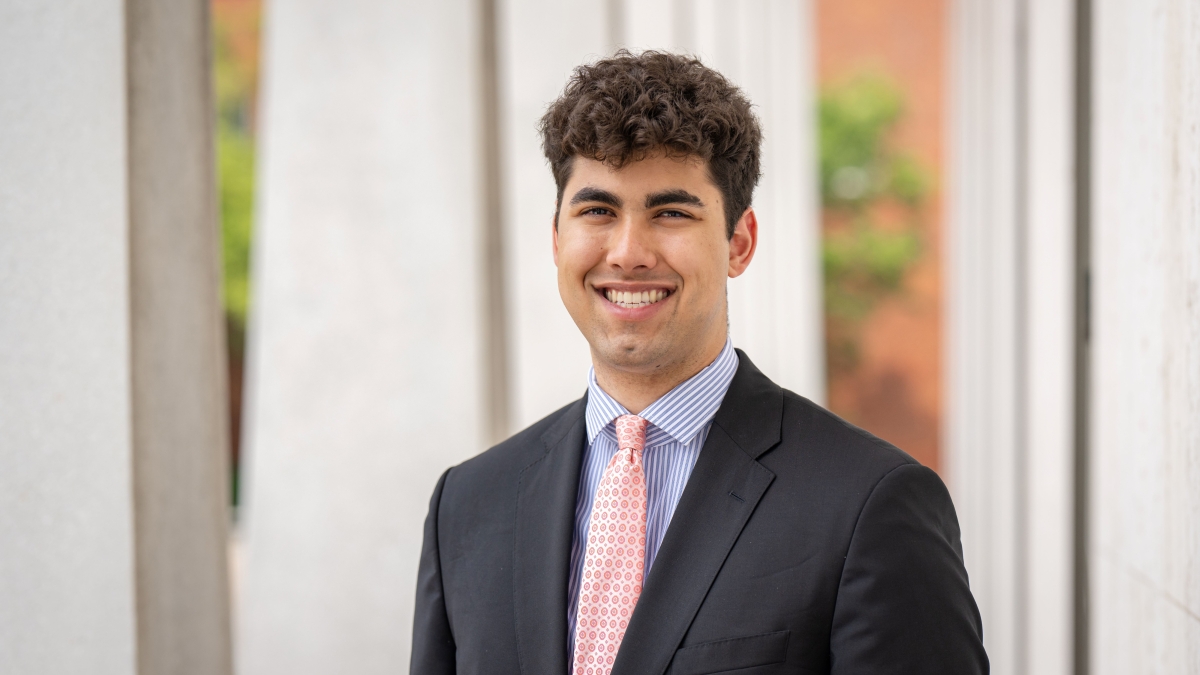ASU honors student 1 of 6 nationwide to be selected as FIRE Campus Scholar

Sami Al-Asady, a junior honors student majoring in political science, has been selected as a 2023 FIRE Campus Scholar.
The Foundation for Individual Rights and Expression, or FIRE, has announced that Arizona State University student Sami Al-Asady has been selected for its 2023 cohort of Campus Scholars, one of only six students selected nationwide.
Al-Asady, a junior in Barrett, The Honors College majoring in political science and civic and economic thought and leadership, will participate in a semesterlong, paid program that seeks to educate and empower U.S. college and university students through programming that promotes FIRE's mission on ASU campuses.
Founded in 1999 with the mission of protecting free speech rights on college campuses, FIRE offers programming, student and faculty outreach, education, advocacy, and policy reform in its efforts to defend and promote the value of free speech for all Americans in courtrooms, on campuses and in culture.
As the son of Iraqi and Bosnian war refugees, Sami Al-Asady appreciates the value of civil liberties all too well.
“My grandfather and uncle were killed for protesting against Saddam Hussein’s regime,” Al-Asady said. “While awaiting United Nations asylum in a Saudi Arabian refugee camp, my father found expression in art and poetry. My mother escaped the genocide against Bosnian Muslims by hiding in Belgrade, Serbia, for six years, speaking to nobody because revealing her origin and religious identity through her speech would mean certain death.”
This strong value for civil liberties and freedom of expression motivates Al-Asady.
“As an American with promised constitutional rights to the freedom of speech and religion, I strive to realize the full extent of my citizenship in public service,” he said. “I have authored several op-eds contributing to the public discourse on contentious issues."
Al-Asady recounts how his perspective on freedom of expression was fortified while serving as a White House intern in fall 2022.
“Most days I entered the White House complex I would observe a different demonstration exercising the right to assembly,” he recalled.
Following his experience in Washington, D.C., Al-Alsady applied for the Campus Scholars program because of his deep concerns for the current state of free speech on college campuses nationwide.
“Colleges and universities ought to be places where people can safely exercise their freedom of thought,” he said. “The value of liberal arts education, like the one students can acquire at Barrett, is the exposure to ideological diversity. Challenging assumptions through education paves the path toward intellectual growth.”
“Students should feel empowered to ask controversial questions and contribute unconventional ideas to discussions without resorting to self-censorship,” Al-Asady said.
Al-Asady emphasizes that while freedom of expression is essential to the educational process, there also exists a fundamental need to stand vigilant against abusive or threatening speech.
“There is a compelling interest to protect marginalized communities from hate speech. I was bullied in middle and high school for my Middle Eastern and LGBTQ+ identity. I was called racial and homophobic slurs that made me feel unsafe at school,” he said.
As for how he hopes to leverage his position to promote free speech on ASU’s campuses, Al-Asady has several ideas in mind.
“I hope to alleviate these free speech challenges by setting a vision for campus discourse that serves the interests of the entire campus community, including students, faculty and administrators,” he said.
At the core of his project is collaboration between students, administration and faculty. Barrett Faculty Chair Jenny Brian has asked him to help coordinate a Braver Angels debate on Nov. 16 in which students will debate the question: Is the right to free speech more important than protecting people from harmful or offensive content?
“The goal is to empower students to have civil and respectful dialogue on controversial topics and, ultimately, host these debates each semester,” he said.
Al-Asady points to Barrett as a key example of how freedom of thought and expression is not only protected, but valued.
“While the honors college’s signature course The Human Event and its Centennial Lectures are examples of how Barrett teaches the skills of active listening, critical thinking and open dialogue, applying this skill set to contemporary issues through student-focused debates can demonstrate the ability of the Barrett community to handle sensitive topics civilly and respectfully,” he said.
More University news

ASU community exceeds goal, raises $835K for Valley of the Sun United Way
The Arizona State University community stepped up and raised over $835,266 for the Valley of the Sun United Way — exceeding the $…

ASU launches online ocean futures undergraduate degrees
Our oceans make up three quarters of the planet’s surface and contain most of its biodiversity. Due to rapid and global changes,…

ASU public affairs graduate programs rise to No. 11 in nation in US News & World Report’s 2025 rankings
Arizona State University rose to No. 11 nationwide for best graduate public affairs programs in U.S. News & World Report’s…

